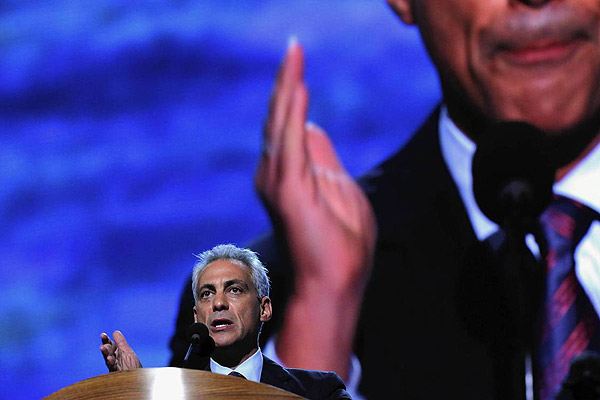
* Pat Quinn. I… missed Pat Quinn's speech. My wife said that he sounded like Bob Odenkirk of Mr. Show and Breaking Bad (Quinn grew up in Hinsdale, Odenkirk in Naperville). It was short.
* Lilly Ledbetter, Ted Strickland. There are two things I enjoy about conventions. The first is regional accents. Pols tend to be older, and have reason to hold on to their accents, so conventions are a Whitman's Sampler of the American language. Neither Ledbetter nor Strickland disappointed.
The former is a woman from Alabama in her mid-70s who was, for two decades, a manager at a Goodyear plant, but her seniority didn't translate into higher pay; she made $500 less per month than her lowest-paid fellow managers, and $1,500 less than the highest-paid ones. She sued and the case went to the Supreme Court; it was tossed on a technicality, but it resulted in Ruth Bader Ginsburg reading a sharply political dissent from the bench, and the Lilly Ledbetter Fair Pay Act, which tightened up the technicality she lost on. Last night was her second DNC appearance, and I can understand why; listening to a tough older Southern woman made me homesick.
Ted Strickland's speech was neither here nor there, but the accents of Ohio—a spectrum of Appalachian and Midwestern—are underrated.
* Rahm Emanuel. Lots of people in Chicago were inexplicably excited to hear the mayor speak. I think they were expecting the Malcolm Tucker character of lore (NSFW).
Behind closed doors Emanuel may well govern in elaborate, obscene poetry, but he campaigns in prose, with all the joy of someone entering a speech into the record. This is not altogether a bad thing; most of the excruciating moments at conventions come from politicians who think they are good public speakers, able to blend statesmanship with borscht-belt cracks (Tim Pawlenty, for example, whose RNC speech was apparently ghostwritten by Neil Hamburger). Emanuel has one gear, efficient conviction.
The most interesting thing about Emanuel's speech is what he didn't say: anything about himself or his tenure as mayor. He spoke not as Mayor of Chicago but as Obama's loyal former chief of staff, which is somewhat unusual for a convention speech. Usually the speeches at least touch on a pol's biography and accomplishments, tying into the themes of the convention while sewing the seeds for current and future campaigns. Emanuel's was all about how awesome his former boss is. This might tamp down on speculation for a presidential run, or it might just reflect his substantial loyalty to the administration.
* Deval Patrick, Michelle Obama. My other favorite thing about conventions is that it's a rare chance to mainline public speaking for four straight evenings (politics is pretty far down on the list)—some of it awful, some of it forgettable, some of it quite wonderful. The two South Side natives were the stars of last night, and it's hard to imagine they'll be succeeded by anyone except the president. They put on a clinic; ideology aside, that's how to give a speech.
What makes a good public speaker is attention to every line; a good speech is through-composed, for lack of a better term. A typical speech paragraph has a specific structure: [stiff joke] [filler rhetoric] [LINE I WORKED REALLY HARD ON AND THAT I EXPECT YOU TO QUOTE IN YOUR STORY]. It's public speaking by pullquote, and it's excruciating.
It's not that Patrick, for example, had burnished prose worthy of Lincoln. Not hardly:
And today Massachusetts leads the nation in economic competitiveness, student achievement, health care coverage, life sciences and biotech, energy efficiency and veterans' services…. Today we're out of the deficit hole Mr. Romney left, and we've achieved the highest bond rating in our history.
But in a larger sense—we cannot dedicate—we cannot consecrate—we cannot hallow—this bond rating.
On paper, it's actually not that much of a speech. But Patrick knows not to neglect the mutt sentences, using them as a bridge to the rousing orations.
Michelle Obama was even better at this. Looking at her speech as prepared for delivery, I get the sense that she used punctuation to pace the speech, a clever trick if you're more accustomed to writing than speaking. For example:
We learned about dignity and decency – that how hard you work matters more than how much you make…that helping others means more than just getting ahead yourself.
We learned about honesty and integrity – that the truth matters…that you don't take shortcuts or play by your own set of rules…and success doesn't count unless you earn it fair and square.
We learned about gratitude and humility – that so many people had a hand in our success, from the teachers who inspired us to the janitors who kept our school clean…and we were taught to value everyone's contribution and treat everyone with respect.
So many dashes and ellipses! No joke: it works.
Obama's "mom-in-chief" speech was not universally well received among the base, or at least the sliver I paid attention to as she was speaking. The speech, and the video that introduced her, were heavy on her role as wife and mother, making no mention of her degrees from Princeton and Harvard, no mention of her jobs at Sidley Austin, City Hall, or the University of Chicago (where, book sales aside, she was the main breadwinner), impressive achievements for a middle-class girl from South Shore, daughter of a city pump worker (and precinct captain) and homemaker. Perhaps the speech spoke for itself; she had the bearing and command of a candidate. But following Lilly Ledbetter's determined pride in work, it was a subtle letdown as the night drew to a close.
Photograph: Chicago Tribune


